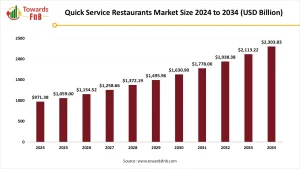The global quick service restaurants market is one of the most dynamic and transformative sectors in the global food industry. Synonymous with convenience, affordability, and consistency, QSRs have evolved from mere fast-food outlets to tech-savvy, customer-centric brands catering to the lifestyle needs of a digitally connected consumer base.
In this blog, we dive deep into the current landscape of the QSR market, highlight the key growth enablers, explore AI’s game-changing role, examine segmentation trends, and spotlight leading global players and regional dynamics.

Market Overview
The global QSR market was valued at approximately USD 853.5 billion in 2024, and is projected to reach USD 1,472.8 billion by 2034, expanding at a CAGR of 5.6% during the forecast period (2025–2034).
- This robust growth is fueled by:
- Rising disposable incomes
- Urbanization and busier lifestyles
- Demand for quick, affordable meals
- Expanding digital ordering and delivery infrastructure
QSRs serve as an essential outlet for both traditional and contemporary food preferences ranging from burgers and fried chicken to sushi, salads, and plant-based alternatives.
Get a Sample Now: https://www.towardsfnb.com/download-sample/5477
Market Growth Factors
- Convenience and Speed
Modern consumers prioritize time-saving options. QSRs offer fast, predictable service that appeals to urban professionals, students, and families alike.
- Digital Transformation
The integration of mobile apps, self-service kiosks, and third-party delivery platforms (like Uber Eats, Swiggy, or DoorDash) has made QSR access more seamless than ever.
- Changing Consumer Preferences
From gluten-free wraps to vegan burgers and low-carb bowls, QSRs are diversifying their menus to meet evolving dietary needs.
- Franchise Expansion
Scalable franchise models have enabled global brands to penetrate new markets quickly with localized offerings and strong brand recognition.
- Boom in Delivery & Takeout
COVID-19 permanently accelerated the growth of delivery-centric dining. QSRs adapted quickly by expanding ghost kitchens and curbside pickup models.
Emerging Market Opportunities
- Health-Focused Menus
Consumers are increasingly demanding low-calorie, organic, and functional foods. QSRs with healthier menu options enjoy broader customer appeal.
- AI & Robotics Integration
AI is being used for demand forecasting, inventory management, dynamic pricing, and personalized marketing. Robotics are being tested for kitchen automation and delivery.
- Sustainability Initiatives
Eco-friendly packaging, waste reduction, and sourcing local ingredients are becoming critical differentiators for QSR brands.
- Tier-2 & Tier-3 City Expansion
QSR chains are increasingly targeting smaller urban centers and suburban markets, especially in Asia and Latin America, where urbanization is accelerating.
- Omnichannel Customer Experience
A seamless blend of online ordering, app-based loyalty programs, and in-store experience is key to capturing and retaining modern consumers.
Grab the Databook and Discover Key Industry Insights Instantly: https://www.towardsfnb.com/download-databook/5477
AI Impact on the QSR Market
Artificial Intelligence is transforming operations across every stage of the QSR business model:
- Predictive Analytics
AI-driven tools forecast demand spikes, reducing waste and optimizing staffing during peak hours.
- Smart Kitchens
Robots and automated machines are being used for flipping burgers, frying food, and assembling orders with speed and consistency.
- Personalized Customer Experience
AI customizes deals and promotions based on past purchase behavior, preferences, and location data.
- Voice & Chatbot Ordering
Voice AI-enabled ordering kiosks and customer service bots streamline operations and enhance accessibility.
- Autonomous Delivery & Routing
AI optimizes last-mile delivery logistics using real-time traffic and weather data, and autonomous delivery robots/drones are under pilot programs.
Top Companies in the Quick Service Restaurants Market
- McDonald’s Corporation
- Yum! Brands Inc. (KFC, Taco Bell, Pizza Hut)
- Restaurant Brands International (Burger King, Tim Hortons, Popeyes)
- Domino’s Pizza Inc.
- Starbucks Corporation
- Inspire Brands (Arby’s, Dunkin’, Sonic)
- Jollibee Foods Corporation
Get detailed pricing and reports now : https://www.towardsfnb.com/price/5495
Segmentation Analysis
By Service Type
- Dine-In
- Drive-Thru
- Takeaway
- Online Delivery
- Curbside Pickup
By Cuisine Type
- Burgers & Sandwiches
- Pizza & Pasta
- Asian Cuisine (Chinese, Japanese, Korean)
- Mexican Cuisine
- Bakery & Coffee
- Healthy/Plant-Based Foods
By Ownership
- Franchised QSRs
- Standalone Chains
- Company-Owned Outlets
By Customer Demographics
- Millennials & Gen Z
- Working Professionals
- Families
- Students
- Health-conscious Consumers
By Distribution Channel
- Offline (Brick & Mortar Stores)
- Online Platforms (Websites & Apps)
- Aggregator Portals (Zomato, Grubhub, Deliveroo)
Region-Wise Insights
North America
- Largest QSR market globally
- Early adoption of tech like AI and voice ordering
- High demand for both legacy (McDonald’s, Taco Bell) and health-forward chains (Sweetgreen, Chipotle)
Europe
- Focus on sustainable menus and clean-label offerings
- Growing demand for vegan and ethnic cuisines
- Germany, UK, and France lead in innovation and expansion
Asia-Pacific
- Fastest-growing region
- Massive youth population and smartphone penetration
- Local giants like Jollibee (Philippines) and global chains expanding rapidly in India, China, and Southeast Asia
Latin America
- Rise in disposable income and urban lifestyle
- Brazil and Mexico are emerging hotspots for franchising
- Growth of fast-casual Latin fusion and QSR pizza brands
Middle East & Africa
- Demand driven by expat populations, especially in the UAE and Saudi Arabia
- Growing local food QSRs alongside global chains
- Market still fragmented, offering huge potential for new entrants
Outlook and Future Opportunities
The Quick Service Restaurants market is more than just fast food it’s a confluence of consumer experience, convenience, and technology. As dietary habits evolve and digital tools advance, QSRs are becoming more agile, health-conscious, and sustainability-driven.
Brands that innovate beyond traditional service models embracing AI, personalization, automation, and eco-conscious strategies will lead the next generation of global dining. For investors, entrepreneurs, and food-tech players, the QSR sector presents a golden opportunity in the evolving landscape of modern foodservice.